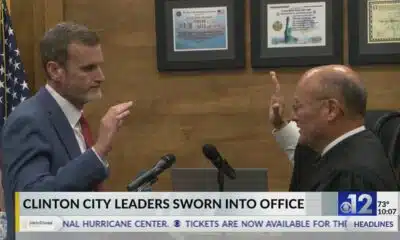Mississippi Today
Gov. Reeves claims ‘best year in state history.’ His 2023 challenger says he’s moved state in ‘wrong direction’
Gov. Reeves claims ‘best year in state history.’ His 2023 challenger says he’s moved state in ‘wrong direction’
The opening salvos of the 2023 governor’s race were fired on Monday as Gov. Tate Reeves delivered his annual State of the State address and his opponent Brandon Presley offered the Democratic Party’s response.
“2022 was perhaps the best year in Mississippi history,” Reeves declared on the south steps of the Mississippi State Capitol on Monday evening. “… Today, it’s a cold-hard-fact that really, really good things are happening in Mississippi. And it’s my honor to stand before you today and announce that the state of our state is stronger than ever.”
Reeves, the first-term Republican governor, focused much of his speech on economic development and touted state government’s nearly $4 billion budget surplus as an example of good times under his watch.
“Our conservative reforms and sound budget management have laid the foundation for this economic boom,” Reeves said. “It’s the policies of yesterday that have paved the pathway to today’s prosperity.”
READ MORE: Transcript: Gov. Tate Reeves delivers 2023 State of the State address
Presley, a Democratic public service commissioner who announced a 2023 challenge of Reeves earlier this month, delivered a response to the State of the State. He blasted the governor’s leadership over the past four years, saying the state is “moving in the wrong direction” under Reeves’ leadership.
“While he brags about a budget surplus, family budgets are running out,” Presley said. “And while you’re careful with your money, he’s throwing your tax dollars away. He’s been caught in the middle of the largest public corruption scandal in our state’s history. $77 million dollars of taxpayer money that should have gone to working families that are struggling instead went to help build a volleyball court… a volleyball court! … Some was even given to Tate Reeves’ own personal trainer. And you should tune in because we are only just now learning how bad and possibly illegal all of this activity was.”
Standing for a recorded video in an abandoned hospital in Newton County, Presley also panned Reeves for refusing to address the state’s hospital crisis.
“We have a solution. By extending Medicaid to the working people of our state, we can keep hospitals across Mississippi from experiencing the same fate as this one,” Presley said. “All Tate Reeves has to do is lift his hand, take an ink pen, and sign on a line. Instead, he lacks the backbone and he will sit on his hands while people lose their jobs, some lose their lives and our hospitals suffer. When Tate Reeves finally wakes up and asks why hospitals are closing, he should look in the mirror.”
READ MORE: Transcript: Brandon Presley offers Democratic response to 2023 State of the State address
Reeves, though, said in his speech that his plan to solve the state’s health care crisis and pending hospital closures is to encourage competition in health care, innovation and technology. He urged lawmakers to “think outside the box” on improving health care and to not expand Medicaid coverage to the working poor.
“Don’t simply cave under the pressure of Democrats and their allies in the media who are pushing for the expansion of Obamacare, welfare, and socialized medicine,” Reeves said. “Instead, seek innovative free market solutions that disrupt traditional healthcare delivery models, increase competition, and lead to better health outcomes for Mississippians. Do not settle for something that won’t solve the problem because it could potentially and only temporarily remove the liberal media’s target on your back. You have my word that if you stand up to the left’s push for endless government-run healthcare, I will stand with you.”
The candidates’ contrast in outlook on state of the state sets up what is expected to be among the most expensive and bitter governor’s races in state history. Reeves will continue boasting what he says are accomplishments and gains the state has made under his leadership, while Presley will continue critiquing the governor’s positions on major issues facing the state.
In a 45-minute speech on Monday, Reeves laid out the accomplishments he said had been achieved.
He said the state set a record economic pace during his governorship, including a $2.5 billion aluminum plant announced near Columbus, for which lawmakers at Reeves’ behest pledged $247 million in incentives.
The favorable economic conditions, Reeves said, “led to investing a historic amount in jobs training, and … resulted in a record $6 billion in new capital investment in 2022, which is more than seven times the previous average of approximately $900 million a year before I became governor.”
Reeves said that wages in Mississippi are rising, by more than $7,000 or 18% per capita since 2019 and the state is seeing “the lowest unemployment rate in our state’s history.”
But despite Reeves’ rosy portrait of the state’s economy, he omitted several key statistics about the state’s economy. Mississippi had the lowest per capita income for 2021 at $45,881, according to the St. Louis office of the Federal Reserve. The average of Mississippi’s four contiguous states, was $52,780.
And, according to the Bureau of Labor Statistics, for the third quarter of 2022, Mississippi’s personal income increased by 3.8%. Eight states saw their personal income increase less than Mississippi’s during the period.
And, based on Bureau of Labor Statistics data, Mississippi added only 500 net jobs between December 2021 and 2022, meaning its job growth for the year was essentially flat, or statistically 0%. All other states had jobs growth of at least 1%, with some exceeding 6%.
Presley, in his response, highlighted some other economic problems the state has faced.
“Mississippi is at the bottom of the nation for economic growth,” Presley said. “We’re one of only three states that lost population, and the numbers recently released by the bureau of labor statistics show zero job growth in Mississippi. We are one of only seven states that taxes groceries.”
Reeves reiterated his vow to eliminate the state’s personal income tax — a proposal lawmakers debated at length last year but defeated, although they did pass the largest income tax cut in state history, which is still being implemented. He did not mention eliminating the grocery tax.
Reeves also said the state has seen historic improvement in education in recent years. He said reforms he helped pass as lieutenant governor about a decade ago have brought much success in public education.
“A little over a week ago we announced – for the third time since I’ve been governor – that Mississippi’s high school graduation rate hit an all-time high and continues to be better than the national average,” Reeves said.
The governor also focused heavily on red-meat conservative issues — in response to what Reeves called “the radical left’s war on our values.”
Reeves reiterated his support for a “Parents Bill of Rights,” similar to legislation being passed or debated in many other GOP-led states that would force public school teachers to share lesson plans and administrators to adhere to the will of parents on things like names, pronouns and other health matters.
Reeves also lamented “a dangerous and radical movement that is now being pushed upon America’s kids” regarding treatment of transgender people and vowed to fight such movements. Legislation is pending this year in Mississippi and other states to ban gender affirming procedures and drugs for anyone 18 or under.
“Across the country, activists are advancing untested experiments and persuading kids that they can live as a girl if they’re a boy, and that they can live as a boy if they’re a girl,” Reeves said. “And they’re telling them to pursue expensive, radical medical procedures to advance that lie.”
To deal with an expected increase in child deliveries from the overturning of Roe v. Wade abortion rights, Reeves said the state should cut red tape and make adoption easier, create child care tax credits and allow parents to write off child care supplies on tax returns and increase support for pregnancy resource centers. He said the state should strengthen its child support laws and force more fathers to support children.
Reeves vowed to help fight crime in the capital city of Jackson and statewide. He also vowed to go after government corruption, such as the state’s massive welfare scandal.”
“That’s why this session, I’m calling on the legislature to make further investment into our Capitol Police by giving them the 150 officers and equipment they need to continue fulfilling their mission and continue pushing back on lawlessness in Jackson,” Reeves said.
And in a statement that directly addresses one of Presley’s points about Reeves involvement in the welfare scandal, the governor vowed that “my administration will go after all crime within our jurisdiction.”
“Regardless of the crime committed, regardless of who did it, regardless if it happened on the street or in an office building, my administration is and will continue to hold criminals accountable,” Reeves said. “That’s why my administration remains committed to delivering justice and recouping every dollar possible from those who stole from Mississippians through the theft of TANF (welfare) dollars.”
Throughout both speeches, the contrast in perspectives between Reeves and Presley were on full display.
“Mississippi is winning, and our state is on the rise,” Reeves said. “I urge all of you here today to stand with me and call out the lies when they are thrown at all of us. We can never give into the cynics who seek to tear down our great state. We can never give into Joe Biden and the national Democrats who seek to force feed us an unhealthy dose of progressivism because they view Mississippians as neanderthals. And we can never give into those who want us to live in a perpetual state of self-condemnation.”
Presley, though critical of Reeves and his leadership, did present a positive outlook on the state’s future.
“Together, we can build a Mississippi that focuses on the future, not the past,” Presley said. “We can build an economy that works for everybody… We should fund the police, increase healthcare, and invest in education. Together, we are going to end the insane grocery tax. We’re going to make sure folks from Walnut on the Tennessee line to Waveland on the Gulf Coast can walk with pride because they have a job and hope for their children’s future.”
This article first appeared on Mississippi Today and is republished here under a Creative Commons license.
Mississippi Today
Trump nominates Baxter Kruger, Scott Leary for Mississippi U.S. attorney posts
President Donald Trump on Tuesday nominated Baxter Kruger to become Mississippi’s new U.S. attorney in the Southern District and Scott Leary to become U.S. attorney for the Northern District.
The two nominations will head to the U.S. Senate for consideration. If confirmed, the two will oversee federal criminal prosecutions and investigations in the state.
Kruger graduated from the Mississippi College School of Law in 2015 and was previously an assistant U.S. attorney for the Southern District. He is currently the director of the Mississippi Office of Homeland Security.
Sean Tindell, the Mississippi Department of Public Safety commissioner, oversees the state’s Homeland Security Office. He congratulated Kruger on social media and praised his leadership at the agency.
“Thank you for your outstanding leadership at the Mississippi Office of Homeland Security and for your dedicated service to our state,” Tindell wrote. “Your hard work and commitment have not gone unnoticed and this nomination is a testament to that!”
Leary graduated from the University of Mississippi School of Law, and he has been a federal prosecutor for most of his career.
He worked for the U.S. Attorney’s Office in the Western District of Tennessee in Memphis from 2002 to 2008. Afterward, he worked at the U.S. Attorney’s Office for the Northern District of Mississippi in Oxford, where he is currently employed.
Leary told Mississippi Today that he is honored to be nominated for the position, and he looks forward to the Senate confirmation process.
This article first appeared on Mississippi Today and is republished here under a Creative Commons Attribution-NoDerivatives 4.0 International License.
The post Trump nominates Baxter Kruger, Scott Leary for Mississippi U.S. attorney posts appeared first on mississippitoday.org
Note: The following A.I. based commentary is not part of the original article, reproduced above, but is offered in the hopes that it will promote greater media literacy and critical thinking, by making any potential bias more visible to the reader –Staff Editor.
Political Bias Rating: Centrist
This article presents a straightforward news report on President Donald Trump’s nominations of Baxter Kruger and Scott Leary for U.S. attorney positions in Mississippi. It focuses on factual details about their backgrounds, qualifications, and official responses without employing loaded language or framing that favors a particular ideological perspective. The tone is neutral, with quotes and descriptions that serve to inform rather than persuade. While it reports on a political appointment by a Republican president, the coverage remains balanced and refrains from editorializing, thus adhering to neutral, factual reporting.
Mississippi Today
Jackson’s performing arts venue Thalia Mara Hall is now open
After more than 10 months closed due to mold, asbestos and issues with the air conditioning system, Thalia Mara Hall has officially reopened.
Outgoing Mayor Chokwe A. Lumumba announced the reopening of Thalia Mara Hall during his final press conference held Monday on the arts venue’s steps.
“Today marks what we view as a full circle moment, rejoicing in the iconic space where community has come together for decades in the city of Jackson,” Lumumba said. “Thalia Mara has always been more than a venue. It has been a gathering place for people in the city of Jackson. From its first class ballet performances to gospel concerts, Thalia Mara Hall has been the backdrop for our city’s rich cultural history.”
Thalia Mara Hall closed last August after mold was found in parts of the building. The issues compounded from there, with malfunctioning HVAC systems and asbestos remediation. On June 6, the Mississippi State Fire Marshal’s Office announced that Thalia Mara Hall had finally passed inspection.
“We’re not only excited to have overcome many of the challenges that led to it being shuttered for a period of time,” Lumumba said. “We are hopeful for the future of this auditorium, that it may be able to provide a more up-to-date experience for residents, inviting shows that people are able to see across the world, bringing them here to Jackson. So this is an investment in the future.”
In total, Emad Al-Turk, a city contracted engineer and owner of Al-Turk Planning, estimates that $5 million in city and state funds went into bringing Thalia Mara Hall up to code.
The venue still has work to be completed, including reinstalling the fire curtain. The beam in which the fire curtain will be anchored has asbestos in it, so it will have to be remediated. In addition, a second air-conditioning chiller needs to be installed to properly cool the building. Until it’s installed, which could take months, Thalia Mara Hall will be operating at a lower seating capacity of about 800.
“Primarily because of the heat,” Al-Turk said. “The air conditioning would not be sufficient to actually accommodate the 2,000 people at full capacity, but starting in the fall, that should not be a problem.”
Al-Turk said the calendar is open for the city to begin booking events, though none have been scheduled for July.
“We’re very proud,” he said. “This took a little bit longer than what we anticipated, but we had probably seven or eight different contractors we had to coordinate with and all of them did a superb job to get us where we are today.”
This article first appeared on Mississippi Today and is republished here under a Creative Commons Attribution-NoDerivatives 4.0 International License.
The post Jackson’s performing arts venue Thalia Mara Hall is now open appeared first on mississippitoday.org
Note: The following A.I. based commentary is not part of the original article, reproduced above, but is offered in the hopes that it will promote greater media literacy and critical thinking, by making any potential bias more visible to the reader –Staff Editor.
Political Bias Rating: Centrist
The article presents a straightforward report on the reopening of Thalia Mara Hall in Jackson, focusing on facts and statements from city officials without promoting any ideological viewpoint. The tone is neutral and positive, emphasizing the community and cultural significance of the venue while detailing the challenges overcome during renovations. The coverage centers on public investment and future prospects, without partisan framing or editorializing. While quotes from Mayor Lumumba and a city engineer highlight optimism and civic pride, the article maintains balanced, factual reporting rather than advancing a political agenda.
Mississippi Today
‘Hurdles waiting in the shadows’: Lumumba reflects on challenges and triumphs on final day as Jackson mayor
On his last day as mayor of Jackson, Chokwe Antar Lumumba recounted accomplishments, praised his executive team and said he has no plans to seek office again.
He spoke during a press conference outside of the city’s Thalia Mara Hall, which was recently cleared for reopening after nearly a year of remediation. The briefing, meant to give media members a peek inside the downtown theater, marked one of Lumumba’s final forays as mayor.
Longtime state Sen. John Horhn — who defeated Lumumba in the Democratic primary runoff — will be inaugurated as mayor Tuesday, but Lumumba won’t be present. Not for any contentious reason, the 42-year-old mayor noted, but because he returns to his private law practice Tuesday.
“I’ve got to work now, y’all,” Lumumba said. “I’ve got a job.”
Thalia Mara Hall’s presumptive comeback was a fitting end for Lumumba, who pledged to make Jackson the most radical city in America but instead spent much of his eight years in office parrying one emergency after another. The auditorium was built in 1968 and closed nearly 11 months ago after workers found mold caused by a faulty HVAC system – on top of broken elevators, fire safety concerns and vandalism.
“This job is a fast-pitched sport,” Lumumba said. “There’s an abundance of challenges that have to be addressed, and it seems like the moment that you’ve gotten over one hurdle, there’s another one that is waiting in the shadows.”
Outside the theater Monday, Lumumba reflected on the high points of his leadership instead of the many crises — some seemingly self-inflicted — he faced as mayor.
He presided over the city during the coronavirus pandemic and the rise in crime it brought, but also the one-two punch of the 2021 and 2022 water crises, exacerbated by the city’s mismanagement of its water plants, and the 18-day pause in trash pickup spurred by Lumumba’s contentious negotiations with the city council in 2023.
Then in 2024, Lumumba was indicted alongside other city and county officials in a sweeping federal corruption probe targeting the proposed development of a hotel across from the city’s convention center, a project that has remained stalled in a 20-year saga of failed bids and political consternation.
Slated for trial next year, Lumumba has repeatedly maintained his innocence.
The city’s youngest mayor also brought some victories to Jackson, particularly in his first year in office. In 2017, he ended a furlough of city employees and worked with then-Gov. Phil Bryant to avoid a state takeover of Jackson Public Schools. In 2019, the city successfully sued German engineering firm Siemens and its local contractors for $89 million over botched work installing the city’s water-sewer billing infrastructure.
“I think that that was a pivotal moment to say that this city is going to hold people responsible for the work that they do,” Lumumba said.
Lumumba had more time than any other mayor to usher in the 1% sales tax, which residents approved in 2014 to fund infrastructure improvements.
“We paved 144 streets,” he said. “There are residents that still are waiting on their roads to be repaved. And you don’t really feel it until it’s your street that gets repaved, but that is a significant undertaking.”
And under his administration, crime has fallen dramatically recently, with homicides cut by a third and shootings cut in half in the last year.
Lumumba was first elected in 2017 after defeating Tony Yarber, a business-friendly mayor who faced his own scandals as mayor. A criminal justice attorney, Lumumba said he never planned to seek office until the stunning death of his father, Chokwe Lumumba Sr., eight months into his first term as mayor in 2014.
“I can say without reservation, and unequivocally, we remember where we started. We are in a much better position than we started,” Lumumba said.
Lumumba said he has sat down with Horhn in recent months, answered questions “as extensively as I could,” and promised to remain reachable to the new mayor.
This article first appeared on Mississippi Today and is republished here under a Creative Commons Attribution-NoDerivatives 4.0 International License.
The post 'Hurdles waiting in the shadows': Lumumba reflects on challenges and triumphs on final day as Jackson mayor appeared first on mississippitoday.org
Note: The following A.I. based commentary is not part of the original article, reproduced above, but is offered in the hopes that it will promote greater media literacy and critical thinking, by making any potential bias more visible to the reader –Staff Editor.
Political Bias Rating: Center-Left
The article reports on outgoing Jackson Mayor Chokwe Antar Lumumba’s reflections without overt editorializing but subtly frames his tenure within progressive contexts, emphasizing his self-described goal to make Jackson “the most radical city in America.” The piece highlights his accomplishments alongside challenges, including public crises and a federal indictment, maintaining a factual tone yet noting contentious moments like labor disputes and governance issues. While it avoids partisan rhetoric, the focus on social justice efforts, infrastructure investment, and crime reduction, as well as positive framing of Lumumba’s achievements, aligns with a center-left perspective that values progressive governance and accountability.
-
Mississippi Today6 days ago
Defendant in auditor’s ‘second largest’ embezzlement case in history goes free
-
News from the South - Georgia News Feed5 days ago
Are you addicted to ‘fridge cigarettes’? Here’s what the Gen Z term means
-
News from the South - Florida News Feed7 days ago
Marcos Lopez arrest: Owner of club named in RICO document
-
The Conversation6 days ago
Toxic algae blooms are lasting longer than before in Lake Erie − why that’s a worry for people and pets
-
News from the South - Tennessee News Feed6 days ago
5 teen boys caught on video using two stolen cars during crash-and-grab at Memphis gas station
-
Local News6 days ago
Mississippi Power shares resources and tips for lowering energy bill in the summer
-
News from the South - Kentucky News Feed6 days ago
Error that caused Medicaid denials has been corrected, says cabinet in response to auditor letter
-
News from the South - Georgia News Feed7 days ago
GOP mega-bill stuck in US Senate as disputes grow over hospitals and more




















































